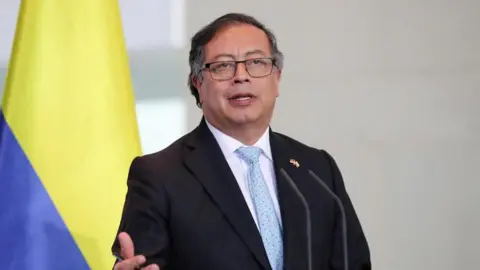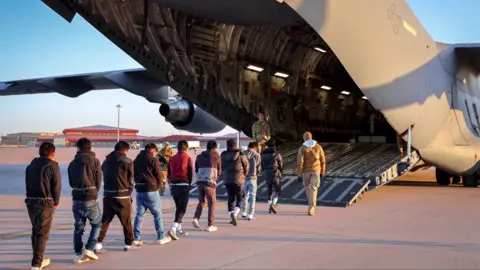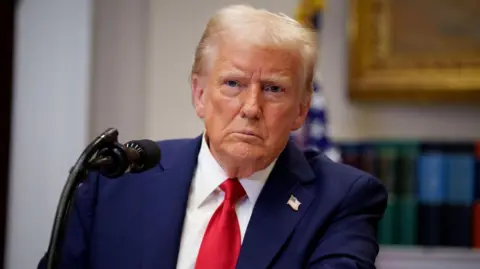Trump imposes 25% tariffs on Colombia as deported migrant flights blocked
 Reuters
ReutersUS President Donald Trump has said he will impose 25% tariffs and sanctions on Colombia after its president barred two US military planes carrying deported migrants from landing in the country.
Trump said the tariffs "on all goods" coming into the US from Colombia would be put in place "immediately", and in one week the 25% tariffs would be raised to 50%.
Colombian President Gustavo Petro responded by saying he would impose retaliatory tariffs of 25% on the US.
Petro earlier on Sunday said he had denied entry to US military deportation flights. He said he would "receive our fellow citizens on civilian planes, without treating them like criminals" and migrants must be returned "with dignity and respect".
US officials told the BBC's US partner, CBS News, that two military planes from San Diego were due to land in Colombia on Sunday with migrant deportees, but those plans were scrapped due to complications.
In response, Trump announced "urgent and decisive retaliatory measures" in a post on TruthSocial. He said the US will impose a travel ban and "immediate visa revocations" on Colombian government officials, as well as its allies and supporters.
Trump also said there would be visa sanctions on supporters of the Colombian government, and enhanced Customs and Border Protection inspections "of all Colombian nationals and cargo on national security grounds".
"These measures are just the beginning," Trump added, saying his administration would not allow the Colombian government "to violate its legal obligations with regard to the acceptance and return of the criminals they forced into the United States".
Petro responded on X by announcing his own tariffs and celebrating Colombia's heritage and resilience.
"Your blockade does not scare me, because Colombia, besides being the country of beauty, is the heart of the world," he said.
He also offered his presidential plane to facilitate the "decent return" of deportees from the US who had been set to arrive in the country.
Also on Sunday, Petro said more than 15,666 Americans were in Colombia illegally - a figure the BBC has not been able to independently verify.
Petro said that unlike the Trump administration, he would "never" be seen carrying out a raid to return illegal US migrants.
 US Government
US Government- Co-operate or else: Trump's Columbia face-off is warning to all leaders
- Six big immigration changes under Trump
The US imports about 20% of its coffee - worth nearly $2bn (£1.6bn) - from Colombia, as well as other goods like bananas, crude oil, avocados and flowers.
Tariffs will make importing these goods more expensive which, if passed onto the consumer, could mean higher coffee prices rising.
Importers could shift to other sources to avoid this, which would in turn hit Colombian producers by reducing a key market.
The sanctions and travel bans on the Colombian government and its supporters, and the breakdown in diplomatic relations that signals, are also significant.
This is now not just a war of trade, but a war of words.
It is no secret that Petro does not like Trump – he has heavily criticised his policies on migration and the environment in the past. That just ratcheted up.
Petro said Trump would "wipe out the human species because of greed" and accused Trump of considering Colombians an "inferior race." He went on to say that he is "stubborn" and that while Trump can try to "carry out a coup" with "economic strength and arrogance" he will, in short, fight back.
"From today on, Colombia is open to the entire world, with open arms," he said.
While Trump is unlikely to take threats from Colombia, this is something that should worry a US president who wants to tackle migration.
Trump's own pick for deputy secretary of state, Christopher Landau, has argued that "working with other countries to stop such migratory flows" must be a "global imperative of US foreign policy".
Tens of thousands of migrants from around the world head north towards the US after landing in South America each year, travelling up through Colombia, usually facilitated by criminal gangs.
The latest developments will no doubt make it harder for Trump's administration to work with Colombia to stop this.
 Getty Images
Getty ImagesThe feud between the two nations comes as Trump's administration has vowed to carry out "mass deportations". The president signed multiple executive orders related to immigration on his first day in office.
Some of Trump's executive orders were signed with the aim of expanding Immigration and Customs Enforcement's (ICE) ability to arrest and detain unlawful migrants on US soil.
White House spokesperson Karoline Leavitt said that 538 arrests were conducted on Thursday alone.
For comparison, ICE detained more than 149,700 people in the 2024 fiscal year under the Biden administration, which equals an average of 409 a day.
Trump declared a national emergency at the Mexico border, ordered officials to deny the right to citizenship to the children of migrants in the US illegally or on temporary visas and re-implemented his "Remain in Mexico" policy from his first term.
On Saturday, US Vice President JD Vance told CBS's Face the Nation that he supports "doing law enforcement against violent criminals".
"Just because we were founded by immigrants doesn't mean that 240 years later that we have to have the dumbest immigration policy in the world," he told CBS's Margaret Brennan.
Tom Homan, Trump's "border tsar" told ABC News on Sunday that the military is currently at the US-Mexico border helping with departure flights on military planes and building infrastructure to secure the border.
"It's sending a strong signal to the world: Our border is closed," he said.
Trump campaigned on securing the southern border and reducing the number of undocumented immigrants who enter the US.
